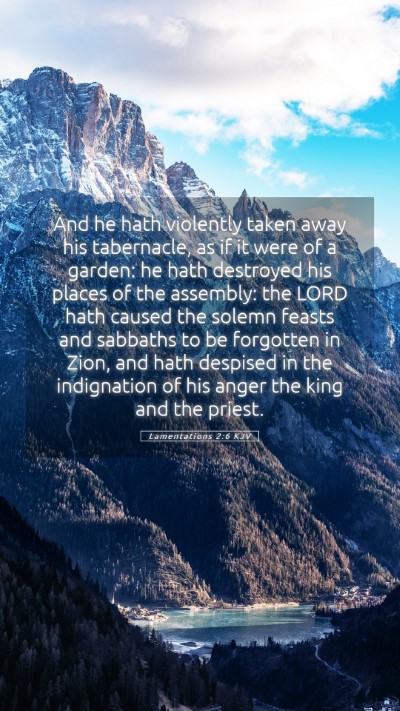Lamentations 2:6 - Bible Verse Commentary and Explanation
Verse Reference: Lamentations 2:6
Verse (KJV): "And he hath violently taken away his tabernacle, as if it were of a garden: he hath destroyed his places of the assembly: the LORD hath caused the solemn feasts and sabbaths to be forgotten in Zion, and hath despised in the indignation of his anger the king and the priest."
Understanding the Context
Lamentations is a poignant expression of grief and lamentation, penned after the destruction of Jerusalem. It vividly portrays the profound loss and desolation experienced by the people of Israel after the Babylonian siege. The author, traditionally attributed to the prophet Jeremiah, reflects on the judgment of God and the heartbreak of a shattered nation.
Commentary Insights
-
Matthew Henry:
Matthew Henry emphasizes the tragic turn of events where God has not only allowed but actively facilitated the destruction of His sanctuary. The phrase "violently taken away" captures the aggressive nature of this Divine act and denotes God’s displeasure. Henry explains that the tabernacle, representing God's presence among His people, has been destroyed, showcasing the depth of Israel's sin and disobedience.
-
Albert Barnes:
Barnes interprets the "places of the assembly" as the central places for worship, which were crucial for the Israelites' communal faith practices. He points out that the loss of these gathering spots signifies the removal of spiritual life and fellowship. This desolation leads to a forgetfulness of holy days and rituals, indicating a complete collapse of the religious fabric of society.
-
Adam Clarke:
Clarke provides a detailed examination of the phrase "the Lord hath caused the solemn feasts... to be forgotten." He argues that the abandonment of these sacred traditions reveals the severity of the judgment. In essence, God has removed the joy and significance of these celebrations as a sign of His wrath. Clarke surmises that this forgetfulness reflects a deeper spiritual barrenness among the people.
Key Themes and Messages
This verse highlights several essential themes crucial for understanding Scripture:
- The Divine Response to Sin: The destruction of the tabernacle symbolizes God's reaction to the persistent sins of His people. It serves as a warning about the consequences of disobedience.
- The Loss of Spiritual Identity: With the destruction of worship places and the forgetfulness of solemn feasts, the Israelites are stripped of their spiritual identity, showcasing the impact of exile on communal faith.
- Judgment and Mercy: While this passage reflects judgment, it also invites reflection on God's mercy and the hope of restoration for those who return to Him.
Cross References
This verse connects with other significant passages that elaborate on similar themes:
- Jeremiah 7:13: "And now, because ye have done all these works, saith the Lord, and I spake unto you, rising up early and speaking, but ye heard not; and I called you, but ye answered not."
- Lamentations 1:10: "The adversary hath spread out his hand upon all her pleasant things: for she hath seen that the heathen entered into her sanctuary, whom thou didst command that they should not enter into thy congregation."
- Amos 5:21-23: "I hate, I despise your feast days, and I will not smell in your solemn assemblies. Though ye offer me burnt offerings and your meat offerings, I will not accept them: neither will I regard the peace offerings of your fat beasts."
Applications for Today
Understanding Lamentations 2:6 is critical for modern readers. Here are some applications for today’s believers:
- Reflect on Spiritual Priorities: The destruction of the tabernacle calls us to evaluate our commitment to gathering for worship and honoring God in our communities.
- Awareness of Sin's Consequences: This verse serves as a reminder that persistent sin can lead to spiritual dryness and separation from God, urging believers to seek repentance and restoration.
- Hope in Restoration: While the passage highlights judgment, it also leads believers to hope for God's mercy, as He desires to bring restoration to those who seek Him.
Conclusion
Lamentations 2:6 provides rich insights into the nature of God’s judgment and challenges us to pursue a deeper understanding of our collective faith. It reinforces critical aspects of Bible verse interpretations and commentary, underscoring the importance of maintaining spiritual practices and the potential consequences of neglect. Delving into this verse helps us grasp the significance of Israel's history and its relevance to contemporary Christians, encouraging ongoing Bible study and reflection.


